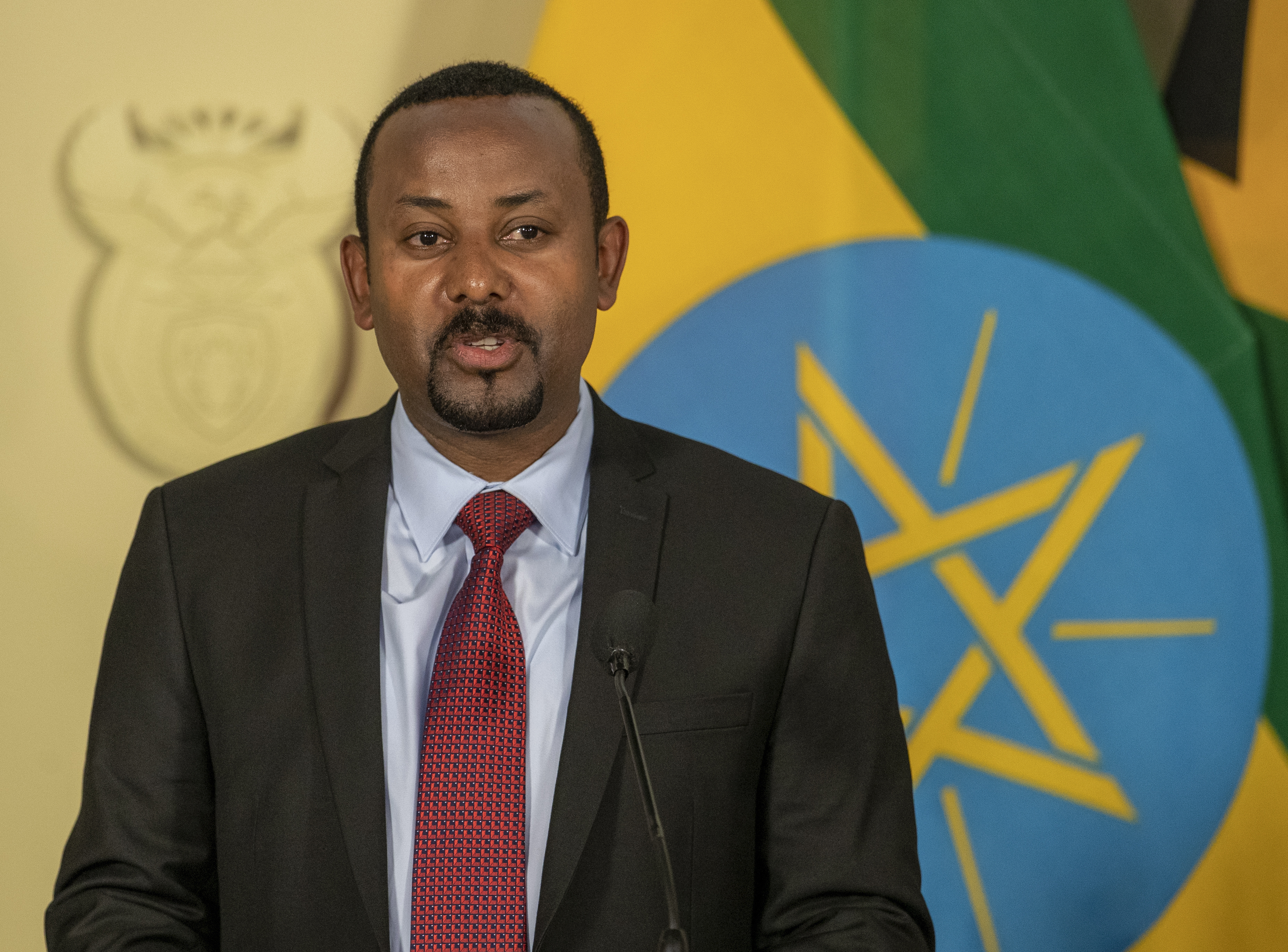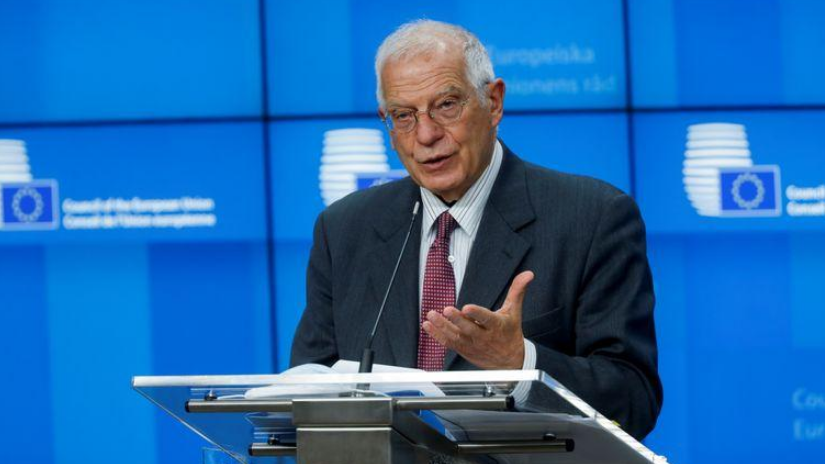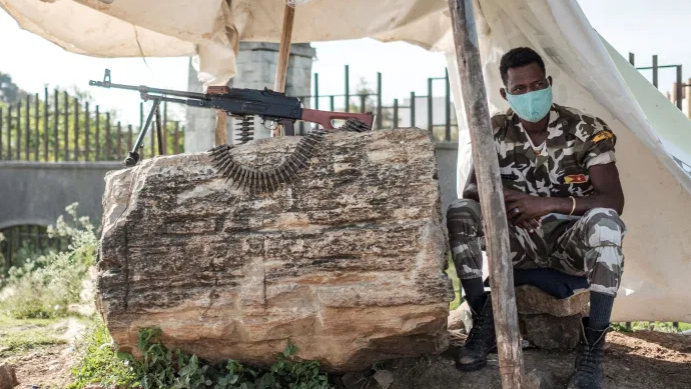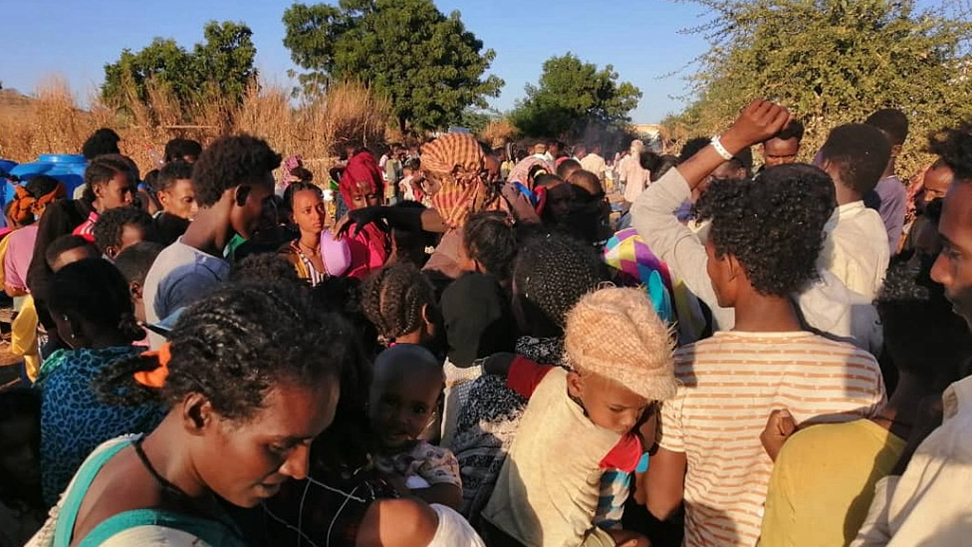
Ethiopia's Prime Minister Abiy Ahmed speaks during a joint media conference with South African President Cyril Ramaphosa in Pretoria, South Africa, on January 12, 2020.
Ethiopia's Prime Minister Abiy Ahmed speaks during a joint media conference with South African President Cyril Ramaphosa in Pretoria, South Africa, on January 12, 2020.
Ethiopia's prime minister is rejecting growing international consensus for dialogue and a halt to deadly fighting in the Tigray region as "interference," saying his country will handle the conflict on its own as a 72-hour surrender ultimatum runs out.
"We respectfully urge the international community to refrain from any unwelcome and unlawful acts of interference," the statement from Prime Minister Abiy Ahmed's office said Wednesday as government forces encircled the Tigray capital, Mekele, with tanks. "The international community should stand by until the government of Ethiopia submits its requests for assistance to the community of nations."

European High Representative of the Union for Foreign Affairs, Josep Borrell, gives a news briefing at the end an informal video conference of EU Defense minister in Brussels, Belgium November 20, 2020. /Reuters
European High Representative of the Union for Foreign Affairs, Josep Borrell, gives a news briefing at the end an informal video conference of EU Defense minister in Brussels, Belgium November 20, 2020. /Reuters
The international community has urgently called for communications to be restored to the Tigray region so warring sides' claims can be investigated, and food and other desperately needed supplies can be sent as hunger grows.
Fighting between Ethiopia's military and regional forces from the northern Tigray region is seriously destabilizing the East African and Horn region and hostilities should halt, the European Union foreign policy chief said.
"I expressed my great concern regarding increasing ethnic-targeted violence, numerous casualties and violations of human rights and of international humanitarian law," Josep Borrell said late on Tuesday after speaking to Ethiopia's foreign minister.
A 72-hour government deadline for Tigray forces to surrender is due to expire on Wednesday evening. The Tigray People's Liberation Front (TPLF), a political party spearheading the fighting, has rejected the ultimatum.
United Nations Secretary-General Antonio Guterres is also "deeply concerned" about the situation in Ethiopia's Tigray region and called for all parties to de-escalate tensions, UN spokesman Stephane Dujarric said on Tuesday.
"Amid reports of a potential military offensive into the regional capital of Mekelle, he urges the leaders of Ethiopia to do everything possible to protect civilians, uphold human rights and ensure humanitarian access for the provision of much-needed assistance," Dujarric said in a statement.
Related story: Ethiopia bombs Tigrayan capital, refuses the international mediation

Ethiopia mobilized for war in the northern Tigray region. /AFP
Ethiopia mobilized for war in the northern Tigray region. /AFP
Tragic conflict: Killing of civilians and refugees
A Tigrayan youth group was accused on Tuesday of killing hundreds of civilians as federal and local forces both claimed advances in a three-week war in the country's mountainous north.
The Ethiopian Human Rights Commission published findings into a November 9 attack in Mai Kadra in southwest Tigray where it said a youth group called Samri killed an estimated 600 civilians, mainly of Amharic descent.
They were beaten to death, stabbed, set on fire and strangled with ropes, the report said, though some residents protected neighbors by hiding them in homes. The commission accused local forces of colluding in the "massacre." The TPLF had previously denied involvement.
Since fighting began on November 4, hundreds have been killed, more than 41,000 refugees have fled to Sudan, and there has been widespread destruction and uprooting of people from homes.
The war has spread to Eritrea, where the Tigrayans have fired rockets, and also affected Somalia where Ethiopia has disarmed several hundred Tigrayans in a peacekeeping force fighting al Qaeda-linked militants. The government said the peacekeepers were being investigated for links to the TPLF.
The conflict threatens to destabilize the vast nation of 115 million people from myriad ethnic groups whose struggles for greater resources and power intensified when Abiy took office.

Ethiopian refugees on their way to Qadarif, eastern Sudan, November 24, 2020. /CFP
Ethiopian refugees on their way to Qadarif, eastern Sudan, November 24, 2020. /CFP
International efforts to end the ongoing conflict
The United States, France and Britain were the latest foreign powers to call for peace. Washington backed African Union (AU) mediation efforts "to end this tragic conflict now", while Paris and London warned against ethnic discrimination.
The situation in Ethiopia was reportedly raised behind closed-doors in the United Nations Security Council on Tuesday by Britain and other European countries on the 15-member body.
It's reported that South Africa, Niger and Tunisia appealed for more time for regional efforts to address the situation before the Security Council considers any action.
"The UN Security Council should do everything in its power to avert a human rights and humanitarian disaster in Ethiopia," Louis Charbonneau, UN Director for Human Rights Watch, said in a statement.
(With input from Reuters)

